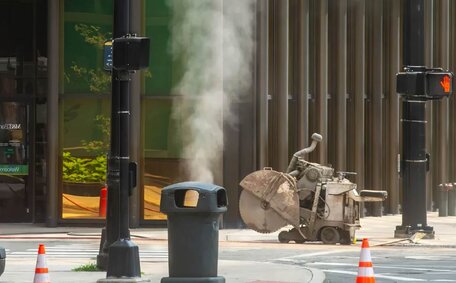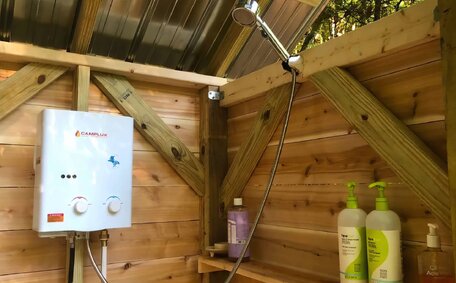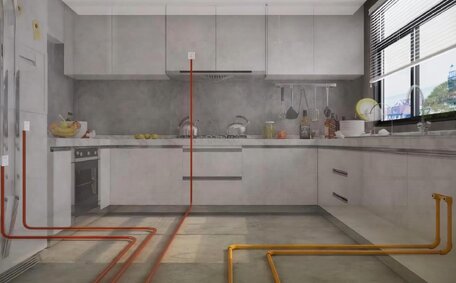
How To Move A Gas Meter
Need your gas meter relocated? You can’t move it yourself - contact your supplier to arrange for a gas engineer to reposition it safely. Charges may apply depending on circumstances.
Read MoreConstruction activities may inadvertently introduce debris into drainage systems and set the stage for significant blockages. During building and renovations, materials such as bricks, mortar, pebbles, and hair soap residues can unintentionally enter pipes, risking blockages.
To safeguard your home during construction, proactive measures like avoiding excess water trickling into drains can prevent this situation. Regular inspections and maintenance of your drains can help avoid major blocks that could clog up the system without such diligence.
Common construction debris known to clog drains includes:
All these materials can compromise your waste systems and potentially affect your garden when they navigate down the drains during construction. Over time they accumulate and severely block drains. Professional drain cleaning and regular flushing of the water heater ensure construction materials don’t congest your drainage system.
Choosing high-quality pipe materials can mitigate the risk of debris buildup and blockages, safeguarding your drains. Copper pipes maintain consistent water pressure and are less prone to deterioration, warding off the risks of burst pipes.
Copper, known for its anti-clogging properties, is an ideal material choice for drainage pipes. Copper pipes resist corrosion, maintaining their integrity and function over many years. This reduces the potential for cracks, leaks, and punctures that frequently lead to drain blockages.
Smooth copper surfaces discourage the build-up of materials that causes blocked drains, such as sediments, hair soap scum, oils, and mineral deposits. This enhances water flow and reduces blockage risks commonly associated with rough materials such as cast iron.
Opting for robust copper plumbing can lessen pipe damage and prevent construction debris intrusion. This prevents many drain clogs and translates to lower maintenance requirements inside your property.
There are several effective methods to prevent construction debris from entering and clogging drains:
Proactive preventative measures will protect your pipes and help prevent debris-related drainage problems in your home. Some key things to remember are using drain screens, not flushing inappropriate items, covering drains when not used, and opting for wider pipes. Taking these basic steps during construction projects will prevent blockages and costly repairs.
Plumbers utilise specialised tools to figure out and ensure your water flows smoothly by identifying and addressing elements that cause blocked issues in drains.
A flexible drain snake, or auger, is an effective tool for reaching clogs, that plumbers commonly utilise. It features a curled metal end allowing plumbers to feed the snake down pipes and hook onto debris. The blockage, which can build up, can then be pulled out or pushed through, preventing further issues.
For stubborn blockages, particularly in kitchen sinks, high-pressure water jets and occasionally boiling water provide an advanced solution. Highly pressurised water, along with home remedies like baking soda, can break down and displace years of accumulated other debris through the pipes.
CCTV drain inspections also help accurately locate blockages that can occur deep within your drainage system. A camera probe is fed down the pipes, enabling plumbers to locate and identify the issue that might cause blockage.
The best approach is engaging qualified tradespeople equipped with the latest tools as tree root can infiltrate and cause obstructions in your drain system.
Regular drain maintenance is vital to prevent blockages and ensure ongoing pipe functionality. Professional services offer long-term benefits by clearing blocked passages and avoiding plumbing issues.
Checking pipe slopes is a crucial maintenance task. Correct gradients let waste water drain freely, countering most common causes of blockages. Professionals use level instruments to accurately measure drainage slopes, pinpointing causes drain obstructions in common plumbing scenarios.
Another important step is Hydro jetting that sprays away the kind of obstructions that tree roots can create, along with grease and other debris. Yearly flushing can minimise build up and improves flow, reducing obstructions.
CCTV drain inspections also help spot minor issues before they become major blockages. Plumbers can assess the interior condition and quickly fix the problem with drains.
For residential drains to operate optimally, consider yearly maintenance plans. Professionals will thoroughly inspect, clean and repair your pipes. This prevents debris accumulation and expensive emergency blockages.
Staying on top of maintenance checks, slope measurements, flushing, inspections and repairs will keep your drainage clear, problem-free and fully functional for years to come.
There are multiple signs of a blocked drain that could signal you have signs blocked drains in your plumbing system:
catching these signs early and contacting a professional plumber can prevent a complete blocked drain. Attempting to use at-home remedies may worsen the issue, so it might be time to call a professional.
Understanding how to fix minor drain problems is essential, as they have a tendency to develop into more severe blockages without rapid response. don’t ignore gurgles, bad smells or slow drainage - it’s the right time to call on professional support without delay.
Equipped with sophisticated tools and expert know-how, we’re ready to address obstructions and urge homeowners to seek professional help before a plumbing crisis occurs.
Certain situations call for the expertise of a professional plumber to address blocked drains:
When you call us, our experienced plumber specialists are prepared to diagnose causes and provide complete solutions for clogged drain pipes and pipe repairs. We can efficiently clear blocked drains, even severe blockages, with methods like pipe relining and prevent ongoing issues.
Rather than battling slow drains, contact your local emergency plumbers any time for guaranteed results. We will restore proper water flow and healthy drainage function.
Need your gas meter relocated? You can’t move it yourself - contact your supplier to arrange for a gas engineer to reposition it safely. Charges may apply depending on circumstances.
Read MoreInvesting in a solar hot water system can save up to 75% on water heating costs. With great returns and added home value, solar hot water can be a smart choice over electric or gas heaters. Contact us to see if it’s the right investment for your home.
Read MoreWhile natural gas and propane can both power appliances in your home, they have notable differences when it comes to BTU output, infrastructure, safety, cost and more. Understanding these key contrasts will help you determine which is better for your specific needs.
Read MoreMenai, 2234 NSW
We will call back as soon as possible.




